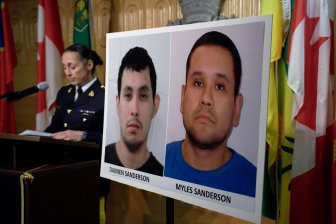The release of a long-awaited United Nations report on China’s treatment of Uyghurs and other Muslim minorities in Xinjiang should spur Canada and international partners to stop products made with Uyghur forced, advocates say.
On Aug. 30, the UN Office of the High Commissioner for Human Rights (UNHCR) released a report on the human rights situation in the Xinjiang Uyghur Autonomous Region, China.
The UN report stated that China‘s detention of Uyghurs and other mostly Muslim ethnic groups in the region “may constitute crimes against humanity,” the Associated Press reported. In addition, the report calls for an urgent international response over allegations of torture and other rights violations in Beijing’s discriminatory action.
Read more:
China furious over UN report on Xinjiang. What’s going on?
Read More
All of that should serve as a push for Canada to block Chinese products made using Uyghur forced labour said one leader with the Canada-based Uyghur Rights Advocacy Project (URAP).
“Because at the end, as Canadians, we end up paying and subsidizing the ongoing genocide indirectly,” said Kayum Masimov, project manager for the project.
“So, unless we have the pockets of the perpetrators, this genocide won’t stop you if you go into any shops in Canada and buy groceries made in China with a very suspicious origin.”
The United Nations report did not call the Chinese treatment of Uyghurs “genocide,” which carries a specific legal definition in international forums — though parliamentarians in countries like Canada have acknowledged it as one.
Masimov said calling it such “could be a good step in a good direction.”
“We have to name the crime by its name,” he said.

What is Canada’s stance on this?
Although Canada’s House of Commons recognized that genocide is taking place in Xinjiang, many Uyghur advocates said it is concerning that the Canadian government “has not officially recognized it yet.”
In February 2021, the Canadian House of Commons passed a motion calling China’s treatment of Uyghurs “genocide,” with 266 votes to zero while the Liberal cabinet abstained from voting.
Masimov said in the past, the Liberal Party’s argument was that the world “genocide is very heavy and we don’t use it lightly.”
“Now, there is a UN report which alleged crimes against humanity might have taken place. So, I’m wondering what other proof Trudeau needs to go ahead and recognize this is a genocide,” he said.
Shortly after the UN report was published, Minister of Foreign Affairs Mélanie Joly issued a statement on Sept 1., saying that Canada has repeatedly expressed concern “with the ongoing gross and systemic human rights violations occurring in Xinjiang affecting Uyghurs and other Muslim ethnic minorities.”
Joly said Canada urges the Chinese government “to uphold its international human rights obligations and respond to the concerns and recommendations raised in the High Commissioner’s report.”
She said Canada will continue to collaborate with its international partners to hold the Chinese government accountable.

On Sept. 2, Canada tweeted that the country’s embassy in Beijing said its posts about a United Nations report on human rights in Xinjiang were taken down from two Chinese social media platforms.
In June, Liberal MP Sameer Zuberi submitted a motion calling for Canada to resettle 10,000 Uyghurs across the globe. Debate on the motion will begin in October.
Masimov said even though it is impossible to rescue Uyghurs directly from concentration camps in China, there are Uyghurs who have fled to neighbouring countries.
“We have people in Pakistan, Thailand, Indonesia, Malaysia, Saudi Arabia, Egypt and Turkey,” said Masimov. “These people are stateless, and they might be deported to China because these governments cooperate with China because they depend on Chinese money very much.”
Raziya Mahmut, who is a scientist and an activist with the International Support for Uyghurs, said Canada should stop funding Chinese companies that are linked to the allegations of crimes against humanity.
She said Canada should also facilitate the immigration process of the Uyghurs coming to settle in Canada, and make it easier for those seeking to come to do so.
“For example, Immigration, Refugees and Citizenship Canada (IRCC) is asking Uyghurs to provide police checks from China, which is just impossible for them to obtain,” she wrote.
She added that Canada doesn’t easily issue visas to Uyghurs with a Chinese passport. She also urges IRCC to expand the family reunification or family sponsorship eligibility for Uyghurs.
Mahmut said countries should also work together to build a program to find missing Uyghur family members in China.
At the same time, China remains Canada’s second-largest trading partner.
Mahmut said Canada is “too dependent on China in manufacturing, which impacts us negatively when they cut off the supply chain for their own agenda.”
“Canadians need to recognize China’s deeply regressive governing ideology and act accordingly,” she said.
URAP’s policy and advocacy Director Miri Teich said China “weaponizes the issues of trade and climate change” to ensure countries like Canada continue to be partners with them.
Teich said Canada needs to evaluate its trade with China more critically going forward.
“There are areas where we think it benefits Canada to continue to cooperate with China when in reality it doesn’t,” said Teich.
© 2022 Global News, a division of Corus Entertainment Inc.


